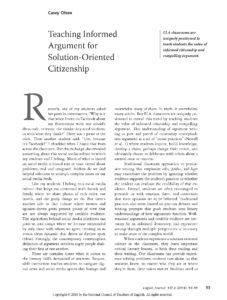Author: Casey Olsen
Summary: In this article, Casey Olsen, a high school teacher involved in the NWP’s College, Career, and Community Writers Program (C3WP), describes an approach to teaching argument that helps his students “develop understandings and skills that change the way they experience the conversations that surround them.” Olsen focuses on approaches such as “argument at a glance,” that provide practice in building arguments, as well as reading and writing strategies that encourage students to understand and evaluate multiple perspectives on an issue rather than engage in binary thinking. Along with specific examples of issues that students considered in their work, Olsen provides an inspiring example of the impact that students’ “solution-oriented” arguments had in their community. If you are working with colleagues to explore argument writing, this article offers a solid approach to helping students develop as thoughtful and ethical writers and communicators.
Original Date of Publication: January 2018
Excerpt
These are complex times when it comes to the literacy skills demanded of students. Responsible instruction teaches students to navigate digital news and social media spaces that barrage and overwhelm many of them. In truth, it overwhelms many adults. But ELA classrooms are uniquely positioned to curtail this trend by teaching students the value of informed citizenship and compelling argument. This understanding of argument writing as part and parcel of citizenship conceptualizes argument as a set of “social practices” (Newell et al. 1) where students inquire, build knowledge, develop a claim, perhaps change their minds, and ultimately choose to deliberate with others about a mutual issue or concern.
Traditional classroom approaches to persuasive writing that emphasize ethos, pathos, and logos may exacerbate the problem by ignoring whether evidence supports the student’s position or whether the student can evaluate the credibility of that evidence. Instead, students are often encouraged to persuade us with emotion, force, and conviction that their opinions are to be believed. Traditional practices also seem fixated on pro-con debates and writing prompts that push students into binary understandings of how arguments function. Wellreasoned arguments and credible evidence are necessary for an informed democracy, and experience sorting through multiple perspectives is necessary to make sense of the complex world.
Related Resources
- Overview of NWP’s College, Career, and Community Writers Program
- Real World History: Six Videos that Model and Inspire
- Improving Students’ Academic Writing: Building a Bridge to Success
- C3WP: Formative Assessment
Olsen, Casey. “Teaching Informed Argument for Solution-Orientated Citizenship.” English Journal 107.3 (2018) 93-99. Copyright ©2018 by the National Council of Teachers of English. Reprinted with permission.
